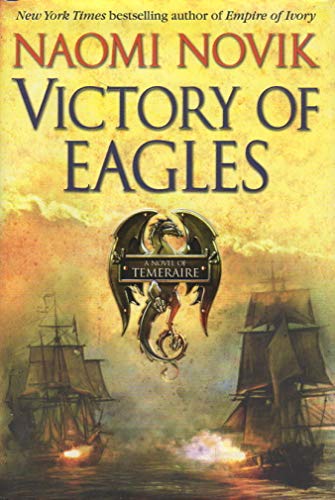Temeraire was not sorry to have killed the soldiers, it was just as well they had, since otherwise they would have had to fight them again... But he was sorry they were dead, and it made one rather sad to look at them.[loc. 1235]
In which Temeraire and Laurence stay in Britain.
After the harrowing finale to Empire of Ivory, Victory of Eagles begins with Temeraire's narrative. Britain is threatened with invasion, but Temeraire has been separated from Laurence and confined to the breeding grounds in a remote Welsh valley. He is lonely, and anxious about Laurence's safety: but his nature, and his determination to improve the lot of himself and his fellow dragons, do not permit him to resign himself to torpor.
Laurence, meanwhile, is not having an altogether pleasant time. Many abhor him: others celebrate his actions. He himself is numb with misery and guilt, and desperate to make his treasonable actions worthwhile. If Napoleon does invade, Laurence will fight to his last breath. Indeed, he might welcome the opportunity to die for his country.
And there's a rumour of 'some bright militia-officer' who has beaten the French infantry not once but twice. Laurence falls in with the courier carrying a colonel's commission to this exemplary soldier, and is surprised by the new colonel's identity.
I vastly enjoyed this book, though it's an emotional roller-coaster. Novik doesn't let us dangle on any one cliffhanger for long, but there is still considerable suspense. Temeraire's viewpoint narrative is a delight: a blend of indignation, pride and deeply-felt (though not much examined) emotion. He is forced to act independently, and take responsibility for others. Some excellent new characters too, including the mathematically-inclined Perscitia, who does not want to fight (hence her banishment to the breeding-grounds) but whose intelligence is a great asset to the militia. She's a great contrast to the fiery (ha!) and impulsive Iskierka, whose craving for treasure not only lumbers her captain Granby with tawdry frippery but also endangers them both.
It's interesting to see Laurence encounter a number of people from his past (Tharkay, his brother and mother, his former fiancee Edith, Jane Roland) and demonstrate how he's changed, and been changed, over the course of the series so far. He does, of course, feel guilty about his effect on each of those individuals: but it's worth noting that nearly all of them are warm and positive towards him. That doesn't help Laurence resolve his trilemma -- duty, honour or justice? -- but does perhaps offer some solace. Tharkay remains one of my favourite characters, especially for his plain-speaking: that seems to get through to Laurence when nothing else does. Temeraire has been shielded from the worst effects of Laurence's crimes, and anyway his moral compass is skewed by his unswerving loyalty to Laurence. Which is not to say that he doesn't continue to surprise Laurence in this volume ...
The military stuff -- right up to the Battle of Shoeburyness, which is set somewhere off one of the beaches I used to visit as a child -- is credible and interesting and distinctly different from our own history. Dragons speed things up, whether troop movements or naval battles or Laurence's process of grief and guilt.
I decided to take a break from this series after this novel, as it seemed a suitable stopping-point and the next book cost more than I prefer to spend on an e-book. This resolution did not last long, though ...

No comments:
Post a Comment